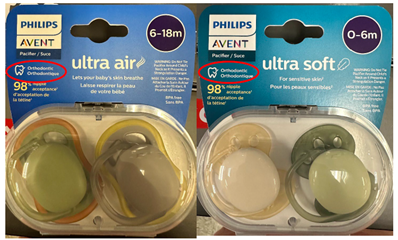Philips Avent Lawsuit Alleges Orthodontic Pacifiers Falsely Advertised As Promoting Oral Development
by Chloe Gocher
Last Updated on February 9, 2026
Deforest v. Philips North America, LLC et al.
Filed: May 21, 2025 ◆§ 1:25-cv-02852
A class action alleges Philips Avent orthodontic pacifiers are falsely advertised as promoting orofacial health despite studies concluding otherwise.
A proposed class action lawsuit claims that Philips North America’s advertisement of its Avent pacifiers as “orthodontic” is false and misleading, given that the products allegedly offer no real benefit to a baby or toddler’s oral development and can, in some cases, harm a child’s orofacial structure.
Get class action lawsuit and settlement news sent to your inbox – sign up for ClassAction.org’s free weekly newsletter.
According to the 50-page lawsuit, the company’s AVENT Ultra Air and AVENT Ultra Soft pacifiers are prominently touted as “orthodontic” even though “no pacifier is capable of promoting oral development,” and despite the fact that prolonged pacifier use can significantly harm the development of a child’s teeth and orofacial structure.
“Dental malocclusions and teeth misalignment may also have a significant adverse effect on psychosocial development, self-image and social well-being,” the filing emphasizes. “Therefore, calling a pacifier ‘orthodontic’ is misleading to the reasonable consumer.”
The complaint alleges that the “orthodontic pacifiers” are not only falsely advertised as “somehow better for a child’s oral health than a generic pacifier,” but that Philips has failed to inform consumers that prolonged pacifier use can be harmful and put a child at an increased risk of developing various dental malocclusions or misaligned teeth.

Cited in the class action lawsuit are various scientific studies that have concluded there exists a lack of scientific evidence to support the idea that using orthodontic pacifiers can prevent malocclusion traits in comparison to conventional pacifiers. The suit summarizes that children who use a pacifier, regardless of its shape, face “higher rates of, and an increased risk for, malocclusion traits” and other oral health-related issues than children who do not use a pacifier.
Related Reading: Philips Avent, Dr. Brown’s Lawsuits Claims Baby Bottles, Cups Leach Microplastics
The lawsuit claims that Philips North America and their subsidiaries are in a superior position to know the risks associated with the use of the Philips Avent pacifiers at issue yet failed to disclose them to consumers.
The plaintiff, a New York resident, contends that she and reasonable consumers would have paid less for the pacifiers, or not purchased them at all, had they been made aware of the medical truths associated with the products.
The lawsuit seeks to represent all United States residents who purchased an Avent-branded Ultra Air or Ultra Soft pacifier within the applicable statute of limitations period.
Check out ClassAction.org’s lawsuit list for the latest open class action lawsuits and investigations.
Video Game Addiction Lawsuits
If your child suffers from video game addiction — including Fortnite addiction or Roblox addiction — you may be able to take legal action. Gamers 18 to 22 may also qualify.
Learn more:Video Game Addiction Lawsuit
Depo-Provera Lawsuits
Anyone who received Depo-Provera or Depo-Provera SubQ injections and has been diagnosed with meningioma, a type of brain tumor, may be able to take legal action.
Read more: Depo-Provera Lawsuit
How Do I Join a Class Action Lawsuit?
Did you know there's usually nothing you need to do to join, sign up for, or add your name to new class action lawsuits when they're initially filed?
Read more here: How Do I Join a Class Action Lawsuit?
Stay Current
Sign Up For
Our Newsletter
New cases and investigations, settlement deadlines, and news straight to your inbox.
Before commenting, please review our comment policy.